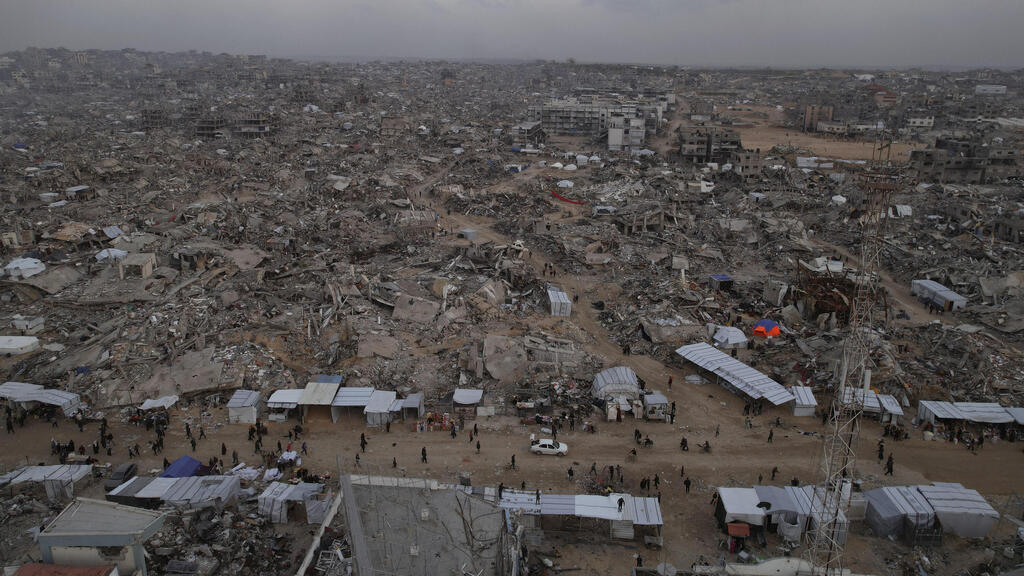“We are the Day After” was the main slogan written across the stage at Deir al-Balah where the ceremony for the release of the three Israeli hostages was held last Saturday. No concept illustrates the sharp gap between the views held in Israel since the war began and reality on the ground, as well as the incessant tendency to create fantasies instead of grapple with a complex and often unoptimistic situation, quite like the 'Day After'.
The common image in Israel is that of “Hamas-less Gaza," at least in the organization’s capacity as ruler. This image reflects a yearning, and is devoid of the explanation as to how or when such a goal may be achieved, and the likelihood of doing so. In effect, as manifest since the cease-fire entered into force (and prior to that), reality on the ground is utterly different: Hamas is the most dominant force in Gaza, despite having sustained unprecedented blows; it has no alternative, nor has any public protest against it been developed.
This state of affairs is frustrating for Israelis. In fact, it means one of the war’s two overarching goals has not been achieved: toppling Hamas. For although this organization has lost some of its power, particularly with respect to its military strength, it continues to govern all areas of life, including education, thus indoctrinating Palestinians undisturbed.
Israel has rightfully focused on achieving its second objective – releasing the hostages – having realized that the slogan whereby it can accomplish both simultaneously is an illusion that is leading it to an endless war of attrition from which no one will emerge victorious, while reducing the chances of hostages being released.
A sober discussion of the Day After is essential. First, fantasies must be delineated. The most prominent beliefs in this context are: that Hamas will willingly leave Gaza, as Arafat had left Lebanon back in 1982, or demilitarize and turn into some sociopolitical movement; the hopes that the Palestinian Authority will regain control of Gaza or that some Arab or international force will assume control over it; and the wishes that a public protest develop against Hamas and destabilize its regime, or that the deradicalization of Gazans be promoted using external mind engineering. The most recent fantasy is President Donald Trump’s vision of a “Gaza with no Gazans,” and the establishment of a “Riviera of the Middle East” in its stead.
In practice, the Day After can be one of only two possibilities. The first – taking over all of Gaza right now, while delivering critical blows to Hamas (on both military and governmental levels), while remaining onsite, and attempting to cultivate a local alternative. On one hand, this option could enable a “Hamas-less Gaza” but on the other it means giving up on the hostages (they cannot be released during such an extreme war that clearly shows Hamas its end is near). It will also require the allocation of many resources and forces for the takeover and extended stay, leading to ongoing threats of terror and guerilla warfare, governing responsibility for over 2 million Gazans, and probably friction with the Arab world and international community.
Get the Ynetnews app on your smartphone: Google Play: https://bit.ly/4eJ37pE | Apple App Store: https://bit.ly/3ZL7iNv
The second option is to examine the initiative being advocated by Egypt for the establishment of an alternative government in Gaza based on the rule of the Palestinian Authority and unaffiliated representatives. One must be aware, though, that even if Hamas will not be the official ruler of Gaza in this scenario, it will certainly have an impact behind the scenes on all areas, and the chances of it agreeing to demilitarize are slim. Hamas has agreed to this plan several months ago, and the Arab world has been trying to promote it aggressively, in the hope that it will appease President Trump, who may view it as a realization of his Hamas-less Gaza vision.
Such a situation will be far from satisfactory, and should be seen as a temporary solution; however, it is the lesser of all evil alternatives. Under such circumstances, Israel would be required to foster the following three principles of action: 1) harsh immediate steps against any security threat that may emerge in Gaza (preparations to carry out a terror attack, weapon smuggling, or building of military infrastructures); 2) U.S. oversight, particularly in the Philadelphi Corridor; and 3) zero involvement in rehabilitation – a process whereby the formula put in place is that once every few years, Hamas wages a war during which Gaza is destroyed, following which the world is forced to rebuild it until the next round of conflict is initiated. Post-war Gaza will be governed by Hamas, but remain backward, providing no financial prospects for its residents.
 Dr. Michael Milshtein
Dr. Michael Milshtein The obligatory basic assumption would have to be that Hamas will forever seek to cause detriment to Israel, and instill its vision of annihilating it to the greater public, rendering coexistence, or indeed any kind of arrangement, impossible. Khalil al-Hayya, Sinwar’s deputy, said as much in a statement he issued last week: “The recently-ended war is a prelude to the liberation of Palestine and annihilation of Israel."
Israel will need a long-term plan if it is to completely alter the reality in Gaza. Doing so will require the use of means that, if used at present, would cause great detriment: taking over Gaza in its entirety, deeply damaging Hamas, staying in the region, and attempting to establish a local alternative. Such an endeavor would require meticulous planning (unavailable on October 7th), the accumulation of resources, and garnering of legitimacy domestically and internationally. It would be a step of historical proportions and, at present, the strategic conditions required for its execution do not exist. Nevertheless, it seems inevitable, and will have to be done in future.
Michael Milshtein is director of the Palestinian Studies Forum in Tel Aviv University’s Moshe Dayan Center.



